#the ongoing India elections
Text
youtube
#Irina Tsukerman (Ep 15): Iran-Israel Tensions#Ukraine#India Elections & More | KAJ Masterclass In this episode#geopolitical analyst Irina Tsukerman provides her expert insights on the tensions between Iran and Israel#the ongoing discussions around US aid to Ukraine#the ongoing India elections#Russia's expanding influence in Africa#and other pressing global issues. Get an in-depth analysis of these critical developments shaping the international landscape.
About
Ir#geopolitical analyst#editor of The Washington Outsider#and president of Scarab Rising#Inc.#a media and security and strategic advisory. Her writings and commentary have appeared in diverse US and international media and have been#' we embark on a fortnightly journey into the heart of global politics. Join us as we traverse the complex geopolitical landscape#delve into pressing international issues#and gain invaluable insights from Irina's expert perspective. Together#we empower you with the knowledge to navigate the intricate world of global politics. Tune in#subscribe#and embark on this enlightening journey with us.
🔥 5 THINGS YOU'LL LEARN IN THIS VIDEO🔥
💼 BUSINESS INQUIRIES 💼
For partnership opportunit#contact us at: [email protected]
**Book host KAJ for speaking engagements#coaching sessions#and more: https://www.thekajmasterclass.live/book-online**
…………………………………………………………………………………
*SUPPORT KAJ MASTERCLASS*
Discover products and#you help us create more valuable content for you. Thank you for your support!
🎙 Elevate your podcast journey! Connect with top podcasters#unlock a FREE exclusive 30-minute handholding session with me#whether you're a host or a guest. Join now: https://www.joinpodmatch.com/kaj
👗 Shop authentic Indian handloom sarees on Ethnics Land (Since#Khudania Ajay (KAJ)#is a seasoned content entrepreneur#podcast host#and independent journalist with over two decades of media industry experience. Having worked with prestigious organizations like CNBC (Indi#Reuters
0 notes
Text
🔅Wed morning SUMMARY - ISRAEL REALTIME - Connecting to Israel in Real Time
🔻no overnight rockets.
🔸ISRAEL : holding strong
Regardless of some media reports and US president Biden’s statements, both Israel’s political class and the Israeli public is holding strong and steady.
There is a lot of room for political maneuvering due to the war, but for the most part the politicians are staying quiet and waiting for the future. Recent polls show the public strongly supports the war, and while they expect new elections - not in the midst of the war.
The distraught hostage families are holding their protests, doing what they think will help - and a bit of anti-govt protestors have glommed on to their events. While they get media attention, they’re not growing.
And the extremely divisive national topic of draft exemptions was brought before the High Court, but the govt and the leading parties have, for the most part, quietly taken the topic to the back rooms.
🔸LEBANON : tit-for-tat continues
The night before last, Israel attacked Hezbollah weapons warehouses in BaalBek - distant from the border.
Hezbollah's response yesterday: launching over 100 rockets and firing along the entire border.
Counterattack by the IDF deep in Lebanese territory in the Bekaa valley, hitting Hezbollah military operations buildings.
Response: IDF attacked "sensitive" Hezbollah targets, as well as a strike at Hezbollah sites in Syria.
🔸GAZA : battles and targeted attacks continue
Yesterday’s hotspot was Deir al Balah, south west Gaza. Forces maneuvered in, artillery strikes, and targeted bombing.
Continued operations in Hamad, Khan Yunis in south Gaza, including capture of an enemy compound with full stock of military weapons and supplies, battles with enemy squads including a squad trying to sneak up and bomb an IDF position.
The IDF also captured and destroyed another enemy rocket launch site.
Targeted bombing is also occurring in Rafah, targeting leadership and command locations, but giving evacuation warnings due to the concentration of civilians. For the moment Israel is not pushing into Rafah.
🔸JUDEA-SAMARIA : ongoing counter-terror
Ongoing reports of security force activity throughout Judea-Samaria, significant concentration on trouble hotspots Jenin, Tulkarm, Shechem, Tubas.
Almost daily reports of security raids capturing terror suspects - often kicking off firefights when they resist which get serious with shoulder rocket launches at buildings and drone strikes.
Not only does this capture violent militants, it gives them a target or worries about defense instead of potentially performing attacks.
🔸IRAQ : they keep trying
Iranian funded and armed Iraq Shia Militias keep trying to attack Israel and putting out press releases on their ‘success’. Because of the distance the only weapons they have are long distance suicide drones, and so far they’ve had only 1 get near Israeli airspace, which was immediately shot down by F16.
🔸HOUTHIS : major impact to the world
The Houthis are attacking commercial shipping in the Red Sea and Gulf of Aden daily, successfully sinking, damaging, and causing ships to be abandoned.
World shipping costs have increased 240% since the Houthis started their attacks.
The shipping protection coalition, with the US, UK, India and various EU countries, is stopping a fair number of the attacks, but even daily airstrikes is not deterring the Houthis. Making it worse, the US/UK airstrikes on Yemen are minimally effective because they don’t know where to hit.
23 notes
·
View notes
Text
Much of India came to a standstill on Jan. 22, when Indian Prime Minister Narendra Modi consecrated a temple in the northern city of Ayodhya commemorating Rama, a warrior-king worshipped by Hindus as a god. Schools, colleges, and offices closed and central government offices gave a half-day off to all employees. Some expectant parents even cajoled obstetricians to schedule cesarean sections on the day so that their children are born at the auspicious moment coinciding with the temple’s opening.
Such a public display of religiosity by the Indian government and its leadership may seem peculiar, particularly to those who cherish secularism. But India moved away from the state’s traditional interpretation of secularism a decade ago, when Modi led the Hindu nationalist Bharatiya Janata Party (BJP) to power. With the next national elections only a few months away, Modi has choreographed the Ram temple consecration to consolidate his Hindu vote (about 80 percent of the country’s population is Hindu). The political intent is clear: Cutouts of Modi grace lampposts on the airport road in Ayodhya, with similar images of Rama added almost as an afterthought. In an audio message on social media this month, Modi said, “God has made me an instrument to represent all the people of India.”
The ongoing construction of Ram Mandir is very controversial in India. From the early 16th century until 1992, a mosque known as Babri Masjid stood on the site—built during the time of the emperor Babur, the first Mughal to rule India. Many Hindus say that Babur destroyed a temple honoring Rama that previously stood on the land, which they believe is Rama’s birthplace. In the 1980s, Hindu activists began a movement to reclaim the site and build a temple there. In December 1992, they razed the mosque, an act that shocked the nation.
But in the past two decades, India has changed, and Hindus clamored for the land to be restored to them. In 2019, the Indian Supreme Court ruled that although the initial act of demolition was illegal, it would offer the site to a Hindu trust to build a temple and grant land elsewhere to a Muslim trust to rebuild a mosque. Although the construction of the Ram Mandir is not yet complete, Modi needs the imagery for his election campaign, and so the consecration will go ahead. Some opposition parties, including the Indian National Congress and the Communist Party of India, did not send their top leadership to the ceremony; however, some Congress leaders were divided over the boycott and at least two attended.
Rama, for many Hindus, is maryada purushottam—the ideal human being who sacrifices himself for others. His is the kind of life to which lesser mortals should aspire; his heroism is based not simply on battlecraft, but upon his ability to put others’ interests before his own. In the Sanskrit epic Ramayana, Rama is the prince of Ayodhya who is about to become king when one of his father’s wives demands that Rama go into exile, and the succession passes to her son instead. Rama leaves with his wife, Sita, and brother Lakshmana. The king of Lanka, Ravana, abducts Sita, and Rama mobilizes an army of monkeys to invade the island fortress, defeating Ravana and rescuing Sita. After 14 years, Rama finally rules Ayodhya, leading to a golden age.
The BJP sees the construction of the Ram Mandir temple as evidence of its single-minded determination, no matter how long it takes. Formed in 1980 by some members of the former Janata Party, the BJP initially struggled electorally. It briefly held power in the 1990s and led a coalition government between 1999 and 2004. In 2014, Modi projected himself as committed to development and boosted the BJP’s vote share to win a majority of seats in parliament with 31 percent of the national vote; five years later, the party increased its tally to 303 seats out of 542, winning 37 percent of the vote. The temple project follows other promises kept by Modi’s government: revoking the special autonomous status of Indian-administered Kashmir and introducing a citizenship act that created a pathway to Indian citizenship for asylum-seekers from neighboring countries but excluded Muslims. Modi has shown that he is the man who gets things done.
The BJP capitalized on three major changes that occurred in India in the 1980s to build its identity and increase its vote share. First, many Indians bristled at how India practiced secularism, perceiving the government as granting special favors to religious communities, such as subsidies for Muslims to perform the Hajj and curriculum exemptions for faith-based schools. Second, Indians were tired of living in an economy beset by sluggish growth and shoddy products due to socialist policies that restricted foreign investment and trade. (That changed in 1991, when the Congress government deregulated the economy.)
Finally, India was a leader in the Non-Aligned Movement, but the appeal of nonalignment was fading with the decline of Soviet influence and the eventual disintegration of the Soviet Union. The Congress party ruled India for most of its first 49 years post-independence, and it was instrumental in developing India’s secularism, socialism, and nonalignment. The BJP took advantage of public disenchantment and stepped into the void, promising “equality for all, appeasement to none,” to promote a market-based economy, and to reset its foreign policy, often aligning with Western interests. (Still, the BJP pursues strategic autonomy in many respects, such as its continuing trade ties with Russia despite Western sanctions.)
Most politicians have the next election on their mind; Modi and the BJP leadership have the next generation in mind. After all, more than 40 percent of Indians have no living memory of the Babri Masjid mosque. Even in the early years, the party began influencing India’s younger generations in the states where it came to power first, changing textbooks and rewriting history to downplay the roles of Mahatma Gandhi and Prime Minister Jawaharlal Nehru (and his family members who later came to power) and project alternative heroes who were more militant and outwardly Hindu. By promoting Rama as the warrior-king who ruled over an ideal state, the BJP aims to create a constituency of voters who see their identity primarily in religious terms and equate the Hindu faith with the nation of India.
To the BJP’s core voters—the hardwired Hindu nationalists—the party has promised to restore Hindu glories, embodied by the Ram Mandir temple. The events in Ayodhya have set a precedent: Some party activists want to transform more mosques (and, in some instances, churches), claiming they were also built where Hindu temples once stood. The triumphalism around the temple construction is so vicious that not only is it the opposition leaders boycotting the event who are facing criticism, but also four seers of the Hindu faith who have raised a range of objections—including the choice of Modi to perform the ceremony, which they say should be presided over by a priest.
The Hindu nationalist movement’s elevation of Rama over other Hindu deities is also strange. Hinduism is polytheistic, and its literature does not rest on one book. Many interpretations are liberal, and some contradict each other: Skepticism and atheism are also part of certain strands of Hinduism. In the late 1980s, I interviewed Morarji Desai, who had served as India’s prime minister representing the Janata Party. I asked him what he thought of the movement to build the Ram temple on the site of Babri Masjid, and he suggested that the BJP’s ultimate goal was to undermine Hinduism’s pluralism and turn it into a faith with one book (the Ramayana), one place of worship (Ayodhya), and one god (Rama). The slogan now reverberating through Ayodhya and much of India is Jai Shri Ram, or “Victory to Lord Rama.”
Rama is an exceptionally interesting and nuanced literary figure and well-loved outside of India, especially in Southeast Asia. But many Indians do not take kindly to works that present Rama in a different light, such as the late poet A.K. Ramanujan’s celebrated essay, “Three Hundred Ramayanas,” which shows how the epic’s characters appear in different forms and offer different interpretations in India and beyond. Nina Paley’s charming 2008 animated film that draws on the Ramayana, Sita Sings the Blues, was also controversial. The latest victim of this outrage is a Tamil film released on Netflix last month, Annapoorani, about the daughter of a Hindu priest who wants to be a chef; her Muslim friend encourages her to pursue her dream, correctly citing a verse from the Ramayana that shows that Rama ate meat. Some Hindus who practice vegetarianism for religious reasons were offended; Netflix withdrew the film, and the actor who played the protagonist issued a public apology on a “Jai Shri Ram” letterhead.
India is no longer a land of nuances. A significant part of its population wants an assertive government and a black-and-white narrative where subjugated Hindus are reclaiming their identity, and the foreigners who colonized the country in the past—the British and, before them, Muslims—are cast as villains. Such an approach risks turning a multidimensional country into a cardboard caricature of itself. The Ram temple consecration marked another milestone on that path—which Modi walks in the hope of getting elected once again.
5 notes
·
View notes
Text
The Ladakh Protest: The 21-day Hunger Strike led by Sonam Wangchuk
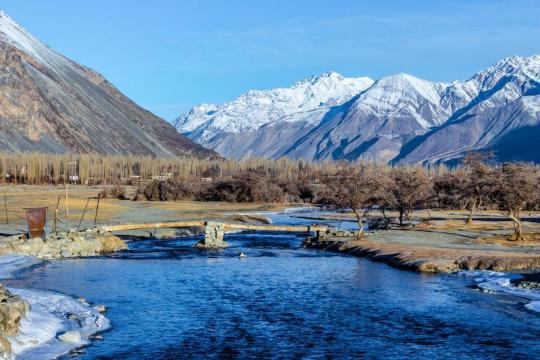
Ladakh, famously known as “Mars on Earth”, is the perfect destination where the mind slows down and the soul finds its path.
It is the northeastern Union territory of India, known for its highest mountain ranges, mesmerizing landscapes, beautiful deep valleys, crystal clear blue lakes, diverse wildlife, highest motorable mountain roads, Buddhist heritage, and the overall picturesque beauty of the place.
Ladakh: A union territory without legislature
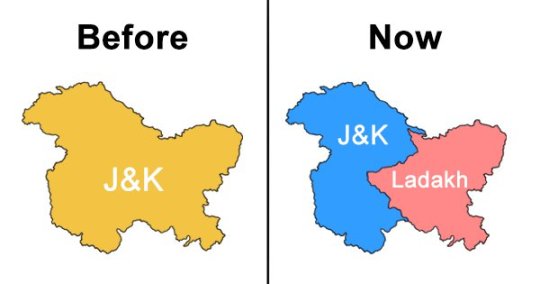
Ladakh, which was a part of Jammu and Kashmir since 1847, was separated from Indian-administered Kashmir in 2019 and was reconstituted as a Union territory on October 31, 2019.
People of Ladakh have constantly demanded separate territory since the 1930s due to the unfair treatment of Kashmir and the prevailing cultural differences between people of Kashmir and Ladakh.
The formation of Ladakh as a separate Union territory was widely celebrated. Still, people were disappointed because it was made a UT without a legislative assembly and would have a lieutenant governor, while Jammu and Kashmir had a legislature.
What does it mean to have no legislature in Ladakh?
Unlike J&K, Ladakh cannot elect its own representative.
Ladakh will be ruled directly by the central government through a lieutenant governor as an administrator.
The President of India has the power to form rules and regulations for Ladakh, according to Article 240.
Sonam Wangchuk following his Father’s footsteps
Sonam Wangyal was born in 1925 in a small village in the Leh district of Ladakh. He worked his entire life for the rights of the people of Ladakh. He had strong secular beliefs.
He was appointed as the MLC of Jammu and Kashmir from 1957–1967 and as the MLA from 1967–1972, due to his selfless service toward the people of Ladakh.
Wangyal was also an active member in the campaign for ST status for Ladakhis, which was carried out between 1982 and 1984.
In 1984, on his five-day hunger strike, the former Prime Minister, Indira Gandhi, visited Leh and requested Wangyal to withdraw from the strike with the promise of granting the status of ST to the people of Ladakh.
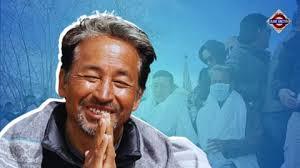
Following his father’s strong morals and values and showcasing his devotion to the land and people of Ladakh, Sonam Wangchuk, a nature activist, engineer, innovator, and educationalist, began a “climate fast for 21 days” on March 6, 2024.
Why are they protesting?
The primary goal behind the protest is to raise awareness about the fragile ecosystem of Ladakh endangered by the growing industrial and developmental projects approved in New Delhi without consent, a threat posed as a result of having no legislative assembly in the Union territory of Ladakh.

The residents of Ladakh have two key demands:
Full-fledged statehood for Ladakh: the residents have demanded to elevate Ladakh’s status as a Union territory to a full-fledged state. This would enable Ladakh to have its own government and the right to form its own rules and regulations in favor of the land and people of the territory.
Integration of Ladakh in the 6th Schedule of the Constitution: The 6th Schedule aims to protect areas with tribal and indigenous populations. By including Ladakh in the 6th schedule, it would allow the state to establish autonomous districts and regional councils.
These elected bodies will have the power to administer and protect the tribal regions of the area. It would give the Ladakhis more control over water management, land use, and cultural preservation.
What is the government’s response to the ongoing protest?
Unlike the response and action taken upon the hunger strike carried out by Wangchuk’s father, the present-day government is MIA.
The current government seems unbothered by the demands and protests in Ladakh, just the way it is, and the deteriorating situation in Manipur.
The pioneers of the movement and every other active citizen in and out of Ladakh are furious about the inaction of the government and the PM, who knowingly promised in his 2019 manifesto of Lok Sabha, that Ladakh will be incorporated into the 6th schedule of the constitution. But apparently, they failed to honor their promises.
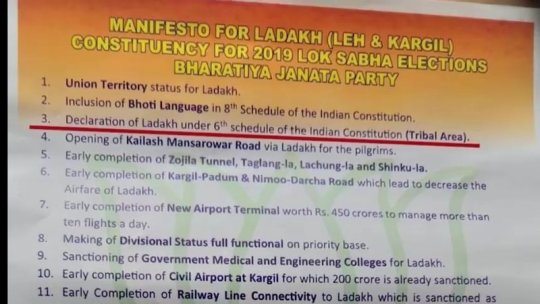
Lack of media coverage:
The lack of media coverage is infuriating for the people of Ladakh and the active citizens of India.
Although the independent media and journalists who are physically present in the ongoing protests do cover the news for the country, But it is disappointing to witness the lack of coverage by mainstream media and the big houses.
The scarcity of coverage of this major issue conceals the truth from the nation. The nation wants to know more about the concerns and affairs of the territory. Unless there is some news from the local media houses, the lack of coverage by the recognized media houses keeps the common man from knowing what is really happening there.
The current news on the Ladakh protest:
According to the current news,
Wangchuk survived solely on water and salt during the 21-day hunger strike (inspired by Gandhiji), which lasted from March 6th to March 26th.
In his speech, he talked about the “21-day fast"—that 21 days was the longest fast that Gandhiji kept during the independence movement.
Wangchuk states that the 21-day fast is over, but the protest will still continue. They will only rest when the government agrees to fulfill their demands.
Wangchuk said, “After me, women will begin a 10-day fast tomorrow. This will be followed by youth and Buddhist monks. Then it could be women, or I could come back. This cycle will go on.”
After ending his 21-day fast, Wangchuk stated “We will continue our struggle (in support of our demands). The gathering of 10,000 people at the venue and the participation of over 60,000 others over the past 20 days is a testimony of the people's aspirations.”
Conclusion:
All things considered, Ladakh, the "Land of High Passes," stands at a crossroads. While the echoes of their protests might fade from national headlines, the Ladakhi people's yearning for a brighter future persists.
Whether they find resolution in the sixth schedule status or the full-throated roar of statehood, one thing is certain: Ladakh's story is far from over.
2 notes
·
View notes
Text
Adam Yosef

Birth : 1981
Occupation : Journalist,LGBTQ+ Activist
Gender : Male
Ethnicity : South Asian, Arab
Sexuality : Pansexual
Religion : Islam
Adam Yosef is a British journalist, photojournalist,LGBTQI+ activist and political activist.He is co-founder of the Stand Up To Racism Birmingham Chapter, Birmingham Against LGBTQI+ Hate, & organiser for Stop the War Coalition.
Yosef has regularly written for the BBC, creating content highlighting issues of socio-politics,diversity,culture,racism and religion.He has also written for the Birmingham Mail,The Forward,IlmFeed, etc. His work also has been featured in The Washington Post, The Mirror and Al-Jazeera.
Yosef is a former member of the Respect Party, campaigning for the party in Birmingham,UK.He supported the Green Party of England and Wales in October 2009.
Early life
Yosef was born in September 1981 in Marston Green,England to a religious muslim family.He is of South Asian and Middle Eastern heritage, with family from India, Kashmir and Iraq.
Career
Public media career
Between 2003 and 2004, Adam Yosef was employed by the Birmingham Central Mosque as a Press & Public Relations representative.He regularly appeared as spokesperson for the trust alongside its chairman, Dr Mohammad Naseem.From 2005, he was Press Officer for politician Salma Yaqoob, the former leader of the Respect Party.He was also Press & Social Media Officer for Salma Yaqoob during the 2010 general election.
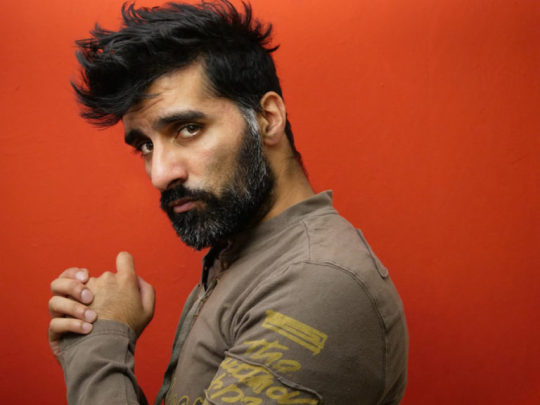
Between 2005 and 2006, Yosef was senior journalist with The Asian Today & Desi Xpress.In 2007, Yosef was appointed deputy editor of national entertainment magazine Ikonz.In 2008, he became a columnist for Fusian magazine. In July 2009, Yosef launched I Am Birmingham, an independent news website serving the West Midlands region, of which he was an editor-in-chief.
In October 2019, public letters written by LGBT+ Labour & LGBT+ Labour West Midlands accusing West Mayoral candidate Salma Yaqoob for homophobia, included claims Adam Yosef was previously employed by Yaqoob and had "called for violence against LGBT+ activists".The letters were shared and endorsed by Labour MPs Wes Streeting & Ben Bradshaw.Then Salma Yaqoob defended her relationship with Yosef, stating: "Adam is a member of the LGBTQI+ community and is an active campaigner for LGBTQ+ rights, who was pivotal in promoting Muslim groups' involvement in Birmingham Pride."Yaqoob's responses to the points made in the letters were backed by LGBT+ activists Owen Jones,Saima Razzaq, Pav Akhtar, who described Yaqoob as an ally.LGBT+ Labour West Midlands has since removed the original letter from their Twitter account.
Activism
In 2003, Yosef co-founded the interfaith Saltley Gate Peace Group, a community peace initiative which was formed in response to the threat of war in Iraq as a part of the growing peace movement in Britain following 9/11, and he was Community & Interfaith Liaison Officer for the Birmingham Stop the War Coalition during this period.He has been actively involved in community work which is related to the Lozells riots, the Alum Rock terror raids & campaigning against radical groups in the Midlands.
In his early twenties, Yosef slept rough on the streets of London before being assisted by The Salvation Army. As a result, founded the Birmingham Food Drive in 2012, which regularly provides food, clothes and essential items to homeless people in the city, and is an active supporter of youth homelessness charity St. Basils.He has also written for Pavement, the magazine for the rough sleepers in the UK.
Between 2011 and 2017, Yosef co-organised the Birmingham Zombie Walk, an annual event which raised thousands of pounds for Birmingham Children's Hospital, as part of an ongoing commitment to the charity.In 2015, Yosef co-founded the Birmingham chapter of the national anti-racism organisation Stand Up To Racism.
In 2021, Yosef co-founded Birmingham Against LGBTQI+ Hate, alongside queer muslim activists Saima Razzaq & Salman Mirza.The group organises rallies against homophobic attacks in the city and has called on city leaders to facilitate better relationships between communities.
Honours
In November 2017, Yosef was nominated & shortlisted for the Inspirational Man accolade at the Birmingham Inspiration Awards.In September 2018, Yosef was nominated & shortlisted for the Excellence in Media accolade at The Birmingham Awards. In 2019 and 2021, he was nominated in the Positive Role Model (LGBT) category for the National Diversity Awards. In 2020, Yosef was presented with an honorary award for 'Outstanding Contribution to LGBTQ+ Equality' award by Midlands Zone magazine.
2 notes
·
View notes
Text
MALE, Sept 9 (Reuters) - Maldives President Ibrahim Solih and his main challenger Mohamed Muizzu are likely to face off in a second round of a presidential election, with results from Saturday's first round showing Muizzu ahead but short of the 50% needed to win outright.
With nearly 195,000 votes counted, Muizzu, seen as favouring closer ties with China, led Solih, who has promoted ongoing warm ties with India, 46% to 40%. Authorities said around 75% of the 282,000 eligible voters had cast ballots.
Solih, seeking a second five-year term, had championed an "India-first" policy during his time in power. The coalition backing Muizzu has launched an "India out" campaign, promising to remove a small Indian military presence of several surveillance aircraft and some 75 personnel.
Muizzu entered the fray after former President Abdulla Yameen was banned from contesting the election by the Supreme Court in August following a conviction for corruption and money laundering.
Thousands turned out early at over 570 polling stations across 187 islands. Maldivians were also voting at polling stations in India, Sri Lanka, Malaysia, Britain and Abu Dhabi.
"We thought turnout might be low during the early stages. However, we have been surprised with many people queuing very early," Fuwad Thowfeek, the president of the Elections Commission told Reuters. "So far, everything is moving smoothly without any disruptions or delays."
2 notes
·
View notes
Text
Helsingin Sanomat carries an editorial on the ongoing government formation talks at the House of the Estates, and their likely impact on trade unions.
HS says that the four right-wing parties engaged in coalition talks have some big disagreements, primarily on immigration and climate change, but there is a consensus on labour market reforms.
Finland's generous income-linked unemployment benefits face a shakeup, according to HS, with payments set to be tapered. That means they will be higher at the start of a stretch of unemployment, but reduce over time as the two-year-eligibility period expires.
The National Coalition Party also wants to eliminate the tax deduction for trade union membership fees, effectively making membership of trade unions more expensive.
HS suggests that the intention is to push union members to join YTK, a fund that offers eligibility for unemployment benefits but does not negotiate pay rises for members or offer many of the other services that come with union membership.
That would weaken the trade unions' voice in society, says HS, likely prompting protests and a vote for the left in the next parliamentary elections — thereby increasing polarisation and features of a two-party system in Finland.
That said, HS warns that a new government is still some way off, and even if it is formed it might not last the distance due to dissent among the ranks of government parties.
Foreign students seeking work
Kauppalehti reports on a hot topic: foreign graduates looking for work. The paper focuses on those from India, interviewing two students hoping to stay in Finland after they finish their degrees.
India has a surplus of workers, says KL, meaning the government there is very happy for young people — even highly educated people — to seek higher incomes and a better life abroad.
The Indians interviewed for the story say they love Finland. India's pollution, corruption and "difficult atmosphere" weigh heavily on their minds, and they love the Finns' peaceful nature and the quality of life obtainable in Finland.
Back in India, one is a university teacher and the other manages a factory. But they are not so optimistic that they expect to find work in their fields in Finland.
One studying business administration says she'll do any work anywhere in the Nordic country, while the factory manager says he is considering driving a truck because he has the licence and it does not require Finnish language skills.
The stats are against them. Finland ranks fourth in the European Union for graduate employment, among graduates from outside the European Economic Area. But that still means only 13 percent of graduates from outside Europe get a job.
KL says that the job search is different in Finland.
"In India jobs are found through networks, but in Finland jobs are generally filled via application processes and according to [candidates'] merits," said KL.
That may come as a surprise to researchers who found recruiters discriminated extensively against those with foreign names.
Speeding fine
Ilta-Sanomat has a classic Finnish story: the quirky news report picked up internationally and then reported through the prism of the foreign news desk interpretations.
Anders Wiklöf, a shipping magnate from Åland, has received a humongous fine for speeding. He was clocked at 82 km/h in a 50 km/h zone, and was fined 121,000 euros.
That's because Finland has a system of income-linked fines for some offences, and Wiklöf's income is pretty high.
The penalty sounds pretty tough to foreign ears, however, and IS notes that the story was covered by The Guardian, the Daily Mail, ABC News and even AS, in Spanish.
The tabloid neglects to credit the original source, however. That appears to be the Aland outlet Nya Åland, which reported the fine two days ago.
Wiklöf had told the paper that he regretted the fine, and had just not slowed down enough when the speed limit changed. He did have a request for those handling his contribution to public coffers, though, suggesting that he has followed government formation talks closer than some.
"I have heard that they are planning to cut 1.5 billion euros from healthcare spending in Finland, so I hope my contribution can fill a gap there," Wiklöf told Nya Åland. "Ideally I'd like it to be earmarked for that purpose."
2 notes
·
View notes
Text
Man suspected of hate crime for allegedly threatening to kill U.S. Rep. Pramila Jayapal – The Seattle Times
https://www.seattletimes.com/seattle-news/law-justice/man-suspected-of-hate-crime-for-allegedly-threatening-to-kill-u-s-rep-pramila-jayapal/
48-year-old Seattle man was arrested Saturday on suspicion of a hate crime for threatening to kill U.S. Rep. Pramila Jayapal, according to King County prosecutors.
A judge on Monday ordered the man remain jailed in lieu of $500,000 bail but denied prosecutors’ request for an anti-harassment order protecting Jayapal, said Casey McNerthney, a prosecutors spokesperson.
Jayapal, 56, is a former state senator who became the first Indian American woman elected to the U.S. House of Representatives in 2016. A Democrat, Jayapal represents Washington’s 7th Congressional District, which includes most of Seattle. Jayapal was born in India and came to the U.S. at 16 to begin college at Georgetown University.
“Congresswoman Jayapal confirms that incidents occurred at her Seattle home on Saturday night when she was present. The Congresswoman and her family are safe and appreciate the many calls and good wishes she is receiving from constituents,” spokesperson Siham Zniber wrote in an emailed statement Monday evening. “She is very grateful for the swift and professional response from the Seattle Police Department, the U.S. Capitol Police, and the FBI investigators who are working together diligently on the investigation and ensuring that she and her family stay safe.”
Jayapal declined further comment because a police investigation is ongoing, the statement said.
15 notes
·
View notes
Text
Hashimpura Massacre
It was the 22nd of May 1987, Ramzan and Friday, just like today, when 'secular' India's most shameful and horrendous custodial kil-ling took place at #Hashimpura. That day, after the Friday prayers, in the midst of the ongoing Meerut riots, some 600-700 Muslims..




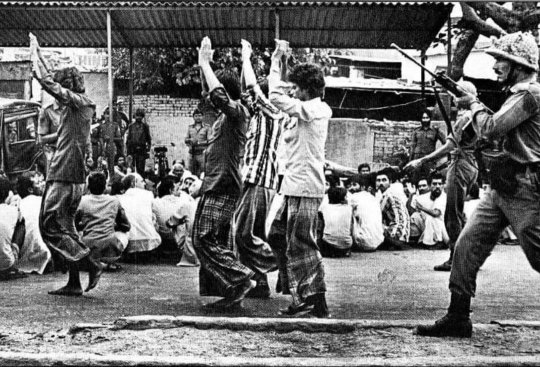
were dragged from their homes by army personnel, CRPF, PAC, and police and were made to sit on the footpath near Gulmarg Talkies. — The young and the strong among them were chosen, loaded in a PAC truck URU 1493, and taken to Upper Ganga Canal in Murad Nagar..
and later to Makanpur in Ghaziabad only to be shot cold-blooded and thrown into the canal. — This was totally an anti-muslim crime by the state, though the documented facts are known to everyone, three points are worth mentioning:
A) On May 23, 1987, at Meerut Circuit House, the next day after the massæcre, there was a meeting attended by Veer Bahadur Singh, the CM, Daya Shankar, the DGP, SK Mukherjee, the IG, Nasim Zaidi, the Ghaziabad DM, Vibhuti Narain, the Ghaziabad SP and other senior officials.
There were discussions that can the bodies of 42 be thrown away in the canal just like Malyana, never to be found? Could the 3 survivors under police protection also die? Would anyone expect justice from them? #HashimpuraMassacre
B) One of the survivors Zulfiqar Nasir had a press conference in Delhi with Syed Shahabuddin and Subramanyam Swami, narrating the nightmare he went through. There was a shameless press brief the next day addressed by Meerut DM RS Kaushik, SSP Girdhari Sharma, nd frmr SP VKB Nair.
Not only did they claim that no massacre happened at Hashimpura but also that no one with the name of Zulfiqar ever lived in Hashimpura. Shouldn't they have been punished too for propagating blatant lies. #HashimpuraMassacre
3) There were three 'Sarkari Musalmans' sitting at the vital position throughout the investigation. Just to show the Indianness in them, they did very little to ensure Justice. Syed Khalid Rizvi, who headed the CID failed to link the role of Major Satish Kaushik whose brother..
Prabhat Kumar, a RSS terrœrist, was killed the previous day; who was present at Hashimpura during the whole incident. Mr Nasim Zaidi who later became chief Election commissioner failed to act responsibly and tell the outside world about the heinous crimes.
And Ms Mohsina Kidwai, the then MP of Meerut who later became the General Secretary of AICC, not only refused to ensure medical care to one of the injured survivors but kept silent about the gory crimes.
— Hashimpura, like the Bihar killings of 1946, Nellie of 1983, Bhagalpur of 1989, Delhi Pogrom of 1984 and 2020, Muzaffarnagar of 2013, Gujarat pogrom of 2002, and numerous others remain a disgraceful instance of the merciless and barbaric use of brute state force..
and a spineless, politically expedient government lying prostate before its own men - The Killers. Hashimpura is not just an instance, it's a phenomenon that goes deep into the mindset of Indian society. Justice is awaited. #HashimpuraMassacre
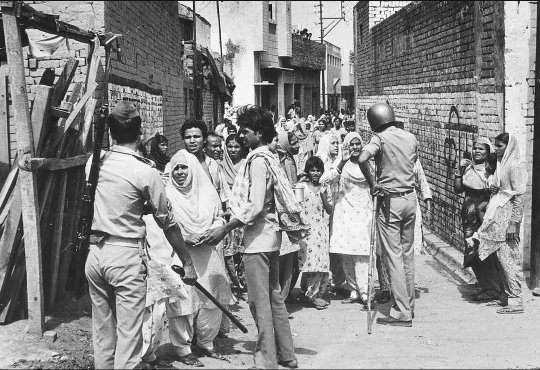

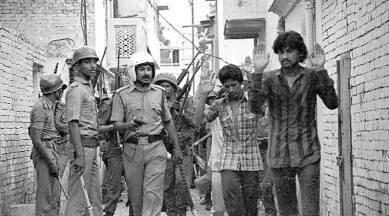


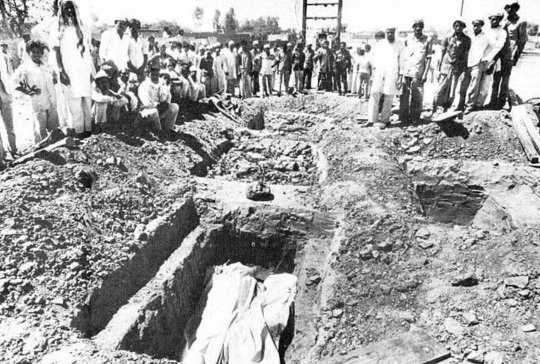
"I wish the dead could have eyes for once, they could look into the Indian State with tears and anger and say that irrespective of any political party at the government, you have been inherently anti-muslim"
#IndianMuslimsUnderAttack#MuslimGenocideInIndia#HindutvaTerrorist#MuslimGenocideAlert#IslamophobiaInIndia
3 notes
·
View notes
Text
6.20.22 Headlines
WORLD NEWS
South East Asia: Floods displace millions and kill dozens in India and Bangladesh (BBC)
“At least 59 people are known to have died in lightning strikes and landslides triggered by severe monsoon storms in India and Bangladesh. Millions of people have been stranded while emergency workers have struggled to reach those affected. Forecasters are warning that the flooding is expected to get worse over the next few days. Some Bangladesh government officials have described the recent flooding as the country's worst since 2004.”
Sri Lanka: Students demand government resign over crisis (AP)
“Thousands of students from state universities marched in Sri Lanka’s capital on Monday to demand the president and prime minister resign over an economic crisis that has caused severe shortages of essential supplies and disrupted people’s livelihoods and education.”
Colombia: First leftist president picked in tight runoff contest (AP)
“Colombia will be governed by a leftist president for the first time after former rebel Gustavo Petro narrowly defeated a real estate tycoon in a runoff election that underscored people’s disgust with the country’s traditional politicians.”
US NEWS
Homelessness: Hundreds of homeless die in extreme heat (AP)
“Around the country, heat contributes to some 1,500 deaths annually, and advocates estimate about half of those people are homeless. Temperatures are rising nearly everywhere because of global warming, combining with brutal drought in some places to create more intense, frequent and longer heat waves. The past few summers have been some of the hottest on record.”
Wikileaks: Julian Assange can be extradited, says UK home secretary (BBC)
“Wikileaks founder Julian Assange’s extradition to the US has been approved by UK Home Secretary Priti Patel. Mr Assange has 14 days to appeal over the decision, the Home Office said. It said the courts found extradition would not be "incompatible with his human rights" and that while in the US "he will be treated appropriately". Mr Assange is wanted by the American authorities over documents leaked in 2010 and 2011, which the US says broke the law and endangered lives. The Wikileaks documents related to the Iraq and Afghanistan wars.”
Title IX: What is Title IX and what impact has it had? (AP)
“Title IX, the law best known for its role in gender equity in athletics and preventing sexual harassment on campuses, is turning 50. It was signed into law by President Richard Nixon on June 23, 1972, after being shepherded through Congress in part by Rep. Patsy Mink, a Democrat from Hawaii who was the first woman of color elected to the U.S. House. The law forbids discrimination based on sex in education, and despite its age remains a vital piece in the ongoing push for equality, including in the LGBTQ community.”
#current events#news#south east asia#india#bangladesh#floods#global warming#climate change#climate crisis#sri lanka#economy#colombia#united states#homelessness#wikileaks#julian assange#title ix#trans rights#lgbtq#gay rights
3 notes
·
View notes
Text
HEATHER COX RICHARDSON
August 15, 2022 (Monday)
Today, President Joe Biden congratulated the people of India on their 75th anniversary of independence, calling out the relationship between “our great democracies” and “our shared commitment to the rule of law and the promotion of human freedom and dignity.”
Yesterday, he lamented the recent knife attack on writer Salman Rushdie, calling out Rushdie’s “insight into humanity,…his unmatched sense for story,…his refusal to be intimidated or silenced,” and his support “for essential, universal ideals. Truth. Courage. Resilience. The ability to share ideas without fear. These are the building blocks of any free and open society. And today, we reaffirm our commitment to those deeply American values in solidarity with Rushdie and all those who stand for freedom of expression.”
But the news today is full not of the defense of democracy, but of those trying to overthrow it.
Emma Brown, Jon Swaine, Aaron C. Davis, and Amy Gardner of the Washington Post broke the story that after the 2020 election, as part of the effort to overturn the results, Trump’s lawyers paid computer experts to copy data from election systems in Georgia. The breach was successful and significant, although authorities maintain the machines can be secured before the next election. Led by Trump ally Sidney Powell, the group also sought security data from Michigan and Nevada, although the extent of the breaches there is unclear. They also appear to have worked on getting information from Arizona.
Georgia prosecutors have told Trump lawyer Rudy Giuliani that he is a target in the criminal investigation of the attempt to alter the results of the 2020 presidential election in Georgia, letting him know it is possible he will be indicted.
Senator Lindsey Graham (R-SC) has tried to quash a subpoena requiring his testimony before a Fulton County grand jury investigating Trump’s efforts to overturn the 2020 election in Georgia, but today a federal judge, U.S. District Judge Leigh Martin May, said he must testify. She said that “the District Attorney's office has shown ‘extraordinary circumstances and a special need for Senator Graham's testimony on issues relating to alleged attempts to influence or disrupt the lawful administration of Georgia's 2020 elections.’"
And yet, the Big Lie that Trump won the 2020 election is still spreading. Amy Gardner in the Washington Post reports that 54 out of 87 Republican nominees in the states that were battlegrounds in 2020 are election deniers. Had they held power in 2020, they could have overturned the votes for Biden and given the election to Trump. In the 41 states that have already winnowed their candidates, more than half the Republicans—250 candidates in 469 contests—claim to believe the lie that Trump won in 2020.
In the issue of Trump’s theft of classified documents from the National Archives and Records Administration when he left office, over the weekend, Maggie Haberman and Glenn Thrush reported in the New York Times that last June, one of Trump’s lawyers signed a statement saying that all classified documents that had made it to Mar-a-Lago had been given back to the National Archives and Records Administration. But, of course, the FBI search of Mar-a-Lago last Monday revealed that assertion to be incorrect.
The statement was made after Jay I. Bratt, the Justice Department’s top counterintelligence officer, visited Mar-a-Lago on June 3. The House and Senate intelligence committees have asked Director of National Intelligence Avril D. Haines to provide the committees with a damage assessment of how badly Trump’s retention of top secret classified documents in an insecure location has damaged national security.
Today, the Department of Justice has asked a judge not to unseal the affidavit behind the search warrant for Mar-a-Lago, saying that it “implicates highly classified materials,” and that disclosing the affidavit right now would "cause significant and irreparable damage to this ongoing criminal investigation." CNN, the Washington Post, NBC News, and Scripps all asked the judge to unseal all documents related to the Mar-a-Lago search. But, “[i]f disclosed,” the Justice Department wrote, “the affidavit would serve as a roadmap to the government’s ongoing investigation, providing specific details about its direction and likely course, in a manner that is highly likely to compromise future investigative steps.”
Legal analyst and Harvard Law professor Laurence Tribe commented: “This suggests [the Department of Justice] wasn’t just repatriating top secret doc[ument]s to get them out of Trump’s unsafe clutches but is pursuing a path looking toward criminal indictment.”
1 note
·
View note
Text
Why the Nifty dropped to 3-week low after hitting fresh highs
Market chatter on changes to capital gains taxes on equities—piling on to prevailing election jitters—dragged India’s benchmark equity indices to their lowest in three weeks, before finance minister Nirmala Sitharaman dismissed what she called “pure speculation". This, after the Nifty50 opened higher on Friday, clocking a record intraday high of 22,794.7 points, until it ended the day’s trading in the red. The India VIX index—the fear gauge—ended 9% higher on Friday, indicative of the heightened volatility in the market.
There has been some anxiety in the market with investors taking some money off the table ahead of and during the ongoing national election. Over the past month, both the Nifty50 and the S&P BSE Sensex have remained almost unchanged, suggesting a cautious sentiment among investors. But profit-booking on Friday was mainly triggered by rumours of changes to the capital gains treatment of equities post the election results, souring investor sentiment further.
“On Friday, rumours of adverse STCG (short-term capital gains) tax changes post the formation of new government and of some cooling of the margin of victory by NDA alliance caused a minor selloff," said Deepak Jasani, head of retail research at HDFC Securities Ltd.
0 notes
Text
Siddaramaiah Denounces Modi Factor, Decries Delayed Relief in Karnataka
Chief Minister Siddaramaiah of Karnataka recently addressed pressing issues facing the state and dismissed the notion of a "Modi factor" influencing the ongoing Lok Sabha elections. In an interview with The Indian Express, Siddaramaiah discussed topics ranging from drought relief to political dynamics. Here are the highlights:
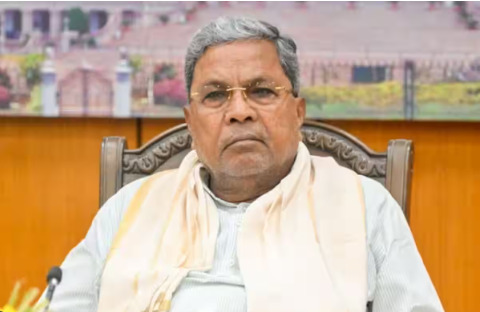
Delayed Drought Relief: Siddaramaiah criticized the Central government for approving only a fraction of the drought relief funds requested by Karnataka. He emphasized that the delayed response and inadequate allocation have exacerbated the challenges faced by farmers in the state.
Absence of Modi Factor: Siddaramaiah asserted that there is no significant "Modi factor" influencing the elections in Karnataka or across India. He cited concerns such as economic stagnation, rising prices, and unemployment as factors overshadowing Modi's image.
Congress Guarantee Schemes: Siddaramaiah highlighted the success of Congress's guarantee schemes in reaching the impoverished sections of Karnataka. He expressed confidence that these initiatives would resonate with voters and bolster Congress's electoral prospects.
Critique of BJP's Claims: Siddaramaiah refuted BJP's allegations regarding the diversion of funds meant for SCs/STs under Congress's welfare schemes. He accused the BJP of spreading misinformation and challenged their record on equitable development policies.
Reservation Policy: Siddaramaiah defended Karnataka's policy of providing reservation to Muslims under the OBC quota, emphasizing its constitutionality and historical context. He criticized the BJP's opposition to this policy, labeling it as politically motivated.
Selection of Candidates: Siddaramaiah addressed concerns regarding the selection of candidates for the Lok Sabha polls, asserting that decisions were made based on merit and local feedback rather than nepotism.
Political Outlook: Siddaramaiah expressed confidence in Congress's electoral prospects, particularly in light of BJP's divisive politics and perceived failures at the national level.
Future as CM: Siddaramaiah clarified remarks made in his Assembly constituency Varuna, stating that his focus is on serving the people and strengthening his political mandate, rather than personal ambitions.
Siddaramaiah's remarks offer insights into the complex political landscape of Karnataka, shedding light on the challenges and opportunities facing the state in the ongoing elections.
0 notes
Text
Few matters are able to rile global publics quite like war in Israel-Palestine. Following Hamas’s brutal Oct. 7 attack on Israel, which left more than 1,200 dead, people have taken to the streets around the world to express solidarity with Israel or to condemn its punishing military response in the Gaza Strip, which has killed more than 22,000 Palestinians to date.
The war has significantly raised tensions in the Middle East, with the battlefield already having expanded to Lebanon, Iraq, Syria, and the Red Sea. Beyond the Middle East, the conflict’s ripple effects have been felt around the world, leading to pitched battles over freedom of speech, intense diplomatic wrangling at the United Nations, and a surge in hate crimes against Jews, Muslims, and Arabs.
This all comes as some 40 percent of the world’s population is set to go to the polls this year in more than 40 countries. And in several of them, the Israel-Hamas war is creating or exacerbating political rifts that could have real electoral consequences. Here is a look at how the conflict could echo through world politics in the coming year.
United States
Outside of Israel itself, the war’s political repercussions will likely be most keenly felt in the United States, where the Israeli-Palestinian conflict is a foreign-policy issue of singular importance to voters. President Joe Biden has resolutely stood by Israel since the Oct. 7 attack, rushing additional U.S. military aid to the country to bolster its Iron Dome missile defenses, pushing Congress to pass a substantial aid package for Israel, and exercising the U.S. veto to block a U.N. Security Council resolution demanding an immediate humanitarian cease-fire in Gaza.
As criticism has grown both internationally and from within his own party over Israel’s conduct in the war and the staggering civilian death toll, Biden has taken a tougher stance on what he has described as Israel’s “indiscriminate” bombing of Gaza, but he has steadfastly refused to attach conditions on U.S. military aid to the country as a means to alter its tactics.
Growing up in the wake of the Holocaust, Biden’s support for Israel is personal and deeply rooted. He has described himself as a “Zionist in my heart.” But he presides over a country and a party deeply divided over how to respond to the war. The Democratic Party’s once-unwavering support for Israel has increasingly been called into question by its progressive flank.
Amid the electorate at large, the picture is equally complicated. A New York Times/Siena College poll published in December found that 57 percent of respondents disapproved of Biden’s handling of the conflict. That figure rises to 72 percent among young voters, a key constituency behind his 2020 victory over Trump.
Foreign policy takes a back seat in U.S. elections—a little more than 1 percent of respondents listed the conflict as the most pressing issue, according to the same poll. But in a presidential race that could come down to the wire, Biden’s staunch support for Israel could cost him precious votes in swing states such as Michigan, which has a large Arab and Muslim population.
U.S. support for Israel has also complicated Washington’s efforts to persuade the global south to stand alongside Ukraine amid its ongoing war with Russia. Biden has sought to tie the two wars together, framing Ukraine and Israel as two democracies at war with foes that seek their annihilation. “History has taught us that when terrorists don’t pay a price for their terror, when dictators don’t pay a price for their aggression, they cause more chaos and death and more destruction,” he said in an Oval Office address in October.
But many observers have accused Washington and the wider West of double standards for their vociferous response to Russia’s occupation of Ukraine and the more muted response to Israel’s ongoing occupation of Palestinian territories.
India
Hundreds of millions of Indians go to the polls in the spring in general elections in the world’s largest democracy. As in the United States, foreign policy is unlikely to be the primary factor in determining the vote’s outcome, but that doesn’t mean it won’t feature at all.
After eschewing diplomatic relations with Israel for decades and only formally establishing them in the 1990s, India has deepened its ties with the country in recent years—particularly since Narendra Modi became prime minister in 2014. This has largely been driven by pragmatism, as India has sought a wider array of partners in the Middle East; Israel today is India’s second largest arms supplier after Moscow.
Israel’s drift toward religious nationalism has also been taken as inspiration by some of Modi’s followers. “India’s Hindu chauvinists see Israel much like they imagine India: as an ethnonationalist majoritarian state facing the existential threat of Islamist terrorism,” writes Daniel Markey for the United States Institute for Peace.
Modi’s Bharatiya Janata Party (BJP), which has long been accused of fanning the flames of Islamophobia in India, tweeted out a video hours after the Hamas attacks that compared the assault to India’s own struggle with Islamist terrorism.
“Comparisons with the situation in Gaza, and broadcasting the BJP’s alleged counterterrorist credentials, has been seen as a powerful mobilizing force in the perspective of the coming elections,” said Nicolas Blarel, an associate professor at the University of Leiden, in an email to Foreign Policy.
The BJP’s embrace of Israel also underscores a key foreign-policy distinction with its main opposition, the Indian National Congress party, which has long sympathized with the Palestinian struggle for statehood. While condemning Hamas’s assault on southern Israel, the party railed against India’s abstention in an October U.N. vote calling for an immediate humanitarian truce.
“India’s response to the conflict may become a wedge issue among the Indian electorate,” said Emmett Potts, a watch operations manager for the Middle East and North Africa region at the risk management consultancy Crisis24, in an email to Foreign Policy.
Germany
In 2008, when then-German Chancellor Angela Merkel visited Israel, she declared the country’s security to be Germany’s Staatsräson, or “reason of state”—meaning it is a foundational priority of the German state, part of the country’s deep commitment to reckoning with its Nazi history. But in recent years, a quiet debate has simmered as to whether Germany’s staunch support for Israel has begun to tread on the toes of freedom of speech when it comes to legitimate criticism of Israel’s government.
The east German state of Saxony-Anhalt is set to require new applicants for German citizenship to confirm in writing that they affirm Israel’s right to exist and “condemn any efforts directed against the existence of the State of Israel.” Antisemitism and denial of Israel’s right to exist are explicitly proscribed by Germany’s Basic Law, by which all citizens are expected to abide.
Yet German intellectuals have traded open letters about the country’s handling of the war, while the country’s famed art scene has seen a wave of events canceled and collaborations suspended over artists’ critiques of Israel or use of the word “genocide” to describe the country’s actions in Gaza.
Some see the extent of the coverage of this debate in the international press as overwrought. “I’m a bit exasperated by this connection that people make about Germany’s ‘vergangenheitsbewältigung,’ coming to terms with our past, and the supposed misjudgment of the German government of the right stance towards Israel in Gaza,” said Jorg Lau, an international correspondent for the German newspaper Die Zeit.
“It’s not unconditional and it’s much more complicated,” he said, noting that German Foreign Minister Annalena Baerbock had spoken out extensively about the humanitarian crisis in Gaza during trips to the region.
The spotlight on Germany’s memory culture could come with a cost, playing into the “Germany first” narrative of the far-right Alternative For Germany party, which is projected to win big in regional elections later this year, alongside a new populist left-wing party. “They both share this idea that we should do away with these constraints of the German past, for different reasons,” Lau said.
Tunisia
In late October, lawmakers in the Tunisian Parliament put forward legislation that would criminalize any efforts to normalize ties with Israel in an attempt to erect a firewall against the wider regional trend of diplomatic rapprochement between Israel and Arab countries that was well underway before the war. The legislation had already been under discussion before the Hamas attack, but it was brought forward quickly in light of the war. Sympathy for the Palestinians is deep and long-standing in Tunisia, which hosted the Palestinian Liberation Organization in the 1980s.
The bill carries stiff penalties of up to 10 years’ imprisonment what it describes as the “crime of normalization.” It would also criminalize any contact with Israeli citizens or companies, which would be difficult and draconian to enforce.
In a surprising turn, the country’s president, Kais Saied—who had previously described any efforts to normalize ties with Israel as treasonous, came out against the bill. Saied, who has a history of making public antisemitic remarks, offered a convoluted explanation that there was no need to criminalize ties with a country that Tunisia doesn’t recognize.
However, some Tunisian lawmakers have alleged that Saied’s U-turn came because the United States intervened in a bid to stop the bill. Referring to what he called “official correspondence from the US Embassy in Tunis addressed to the Ministry of Foreign Affairs,” one member of parliament involved in the process told Le Monde that the United States had threatened to impose sanctions on Tunisia if the bill passed. The U.S. State Department did not immediately respond to a request for comment about the allegations.
Saied has been accused of steadily dismantling Tunisia’s democratic institutions, so it’s unlikely that his surprise rebuke of parliament over the bill will impact the outcome of presidential elections later this year. But the perception that Western countries have stood by Israel as it has laid siege to the Gaza Strip has had a profound impact on Arab public opinion.
An Arab Barometer poll, the survey period of which straddled the Oct. 7 attacks, found that favorability ratings of countries with strong or warming ties with Israel dropped sharply as Israel’s military campaign got underway. Tunisia is just one country, but the study’s architects noted in a piece for Foreign Affairs that the country has historically been a robust bellwether for public opinion across the Arab world.
“It’s going to have lasting impacts,” said Fadil Aliriza, a nonresident scholar at the Middle East Institute. “We’ve seen people rejecting prizes that they’ve gotten from the EU, we’ve seen people publicly rejecting honors they’ve been given from the West,” he said. “They believe that the West has really been complicit in the war.”
4 notes
·
View notes
Text
Mehbooba Mufti criticizes delayed polls in Anantnag-Rajouri, calls for voter vigilance | India News
People’s Democratic Party (PDP) chairperson Mehbooba Mufti has alleged that the authorities have deliberately delayed the elections in Anantnag-Rajouri Lok Sabha constituencies to manipulate voters in favor of BJP allies and prevent people from voicing their rights against the ongoing attacks on Jammu. and Kashmir’s identity and resources.
Addressing the election rallies at Manial Gali in…
View On WordPress
0 notes
Text
Top 5 @Wikipedia pages from yesterday: Friday, 26th April 2024
Welcome, welcome, velkommen, mirë se vjen 🤗
What were the top pages visited on @Wikipedia (26th April 2024) 🏆🌟🔥?

1️⃣: 2024 NFL draft
"The 2024 NFL draft is the ongoing 89th annual meeting of National Football League (NFL) franchises to select newly eligible players. The draft is being held around Campus Martius Park and Hart Plaza in Detroit, Michigan, on April 25–27, 2024. The Chicago Bears held the first pick in the draft,..."
2️⃣: 2024 Indian general election
"General elections are being held in India from 19 April to 1 June 2024 in seven phases, to elect 543 members of the Lok Sabha. The votes will be counted and the results will be declared on 4 June 2024. This is the largest-ever election in history, surpassing the 2019 Indian general election, and..."

Image licensed under CC BY-SA 3.0? by Furfur
3️⃣: Indian Premier League
"The Indian Premier League (IPL), also known as the TATA IPL for sponsorship reasons, is a men's Twenty20 (T20) cricket league held annually in India. Founded by the BCCI in 2007, the league features ten city-based franchise teams. The IPL usually takes place during the summer, between March and May..."
4️⃣: Richard Gadd
"Richard Robert Steven Gadd (born 11 May 1989) is a Scottish writer, actor and comedian. He created and starred in the 2024 Netflix drama series Baby Reindeer, based on his one-man show and real-life experience...."
5️⃣: Challengers (film)
"Challengers is a 2024 American romantic sports drama film directed by Luca Guadagnino from a screenplay by Justin Kuritzkes. It follows a professional tennis champion (Mike Faist) who plots a comeback with the help of his wife (Zendaya), a former tennis prodigy who retired after an injury, as he..."
0 notes